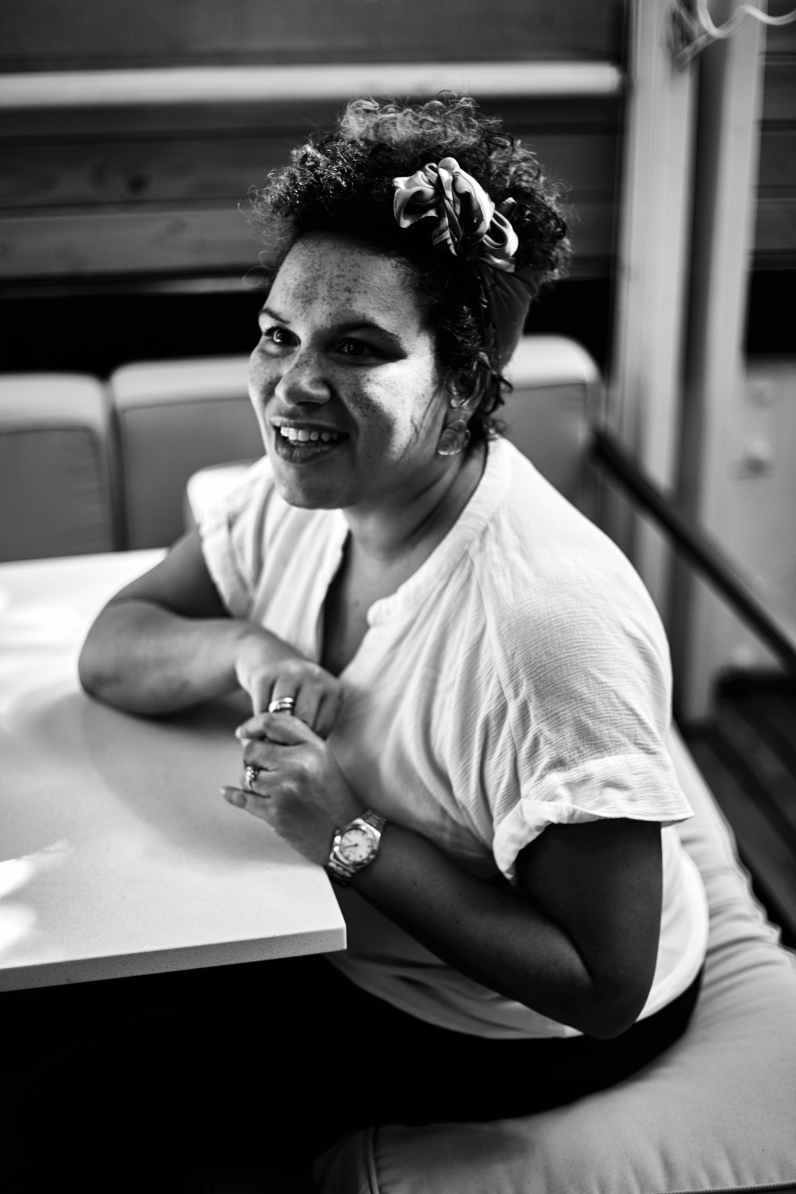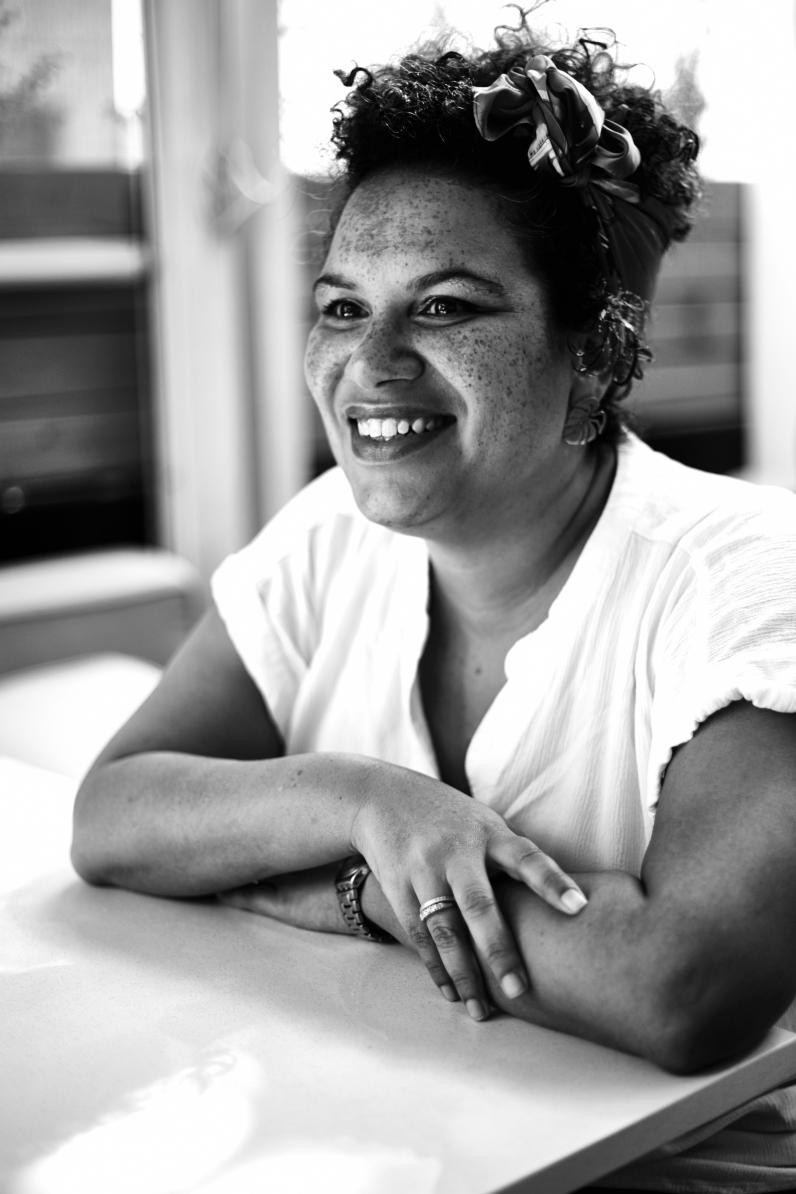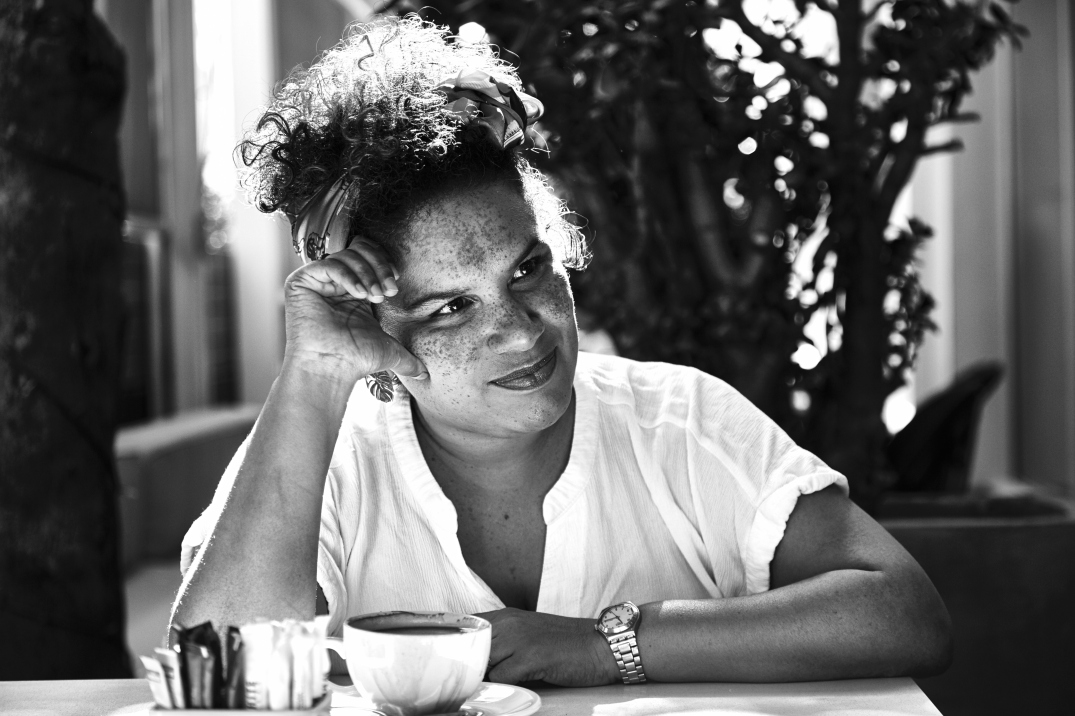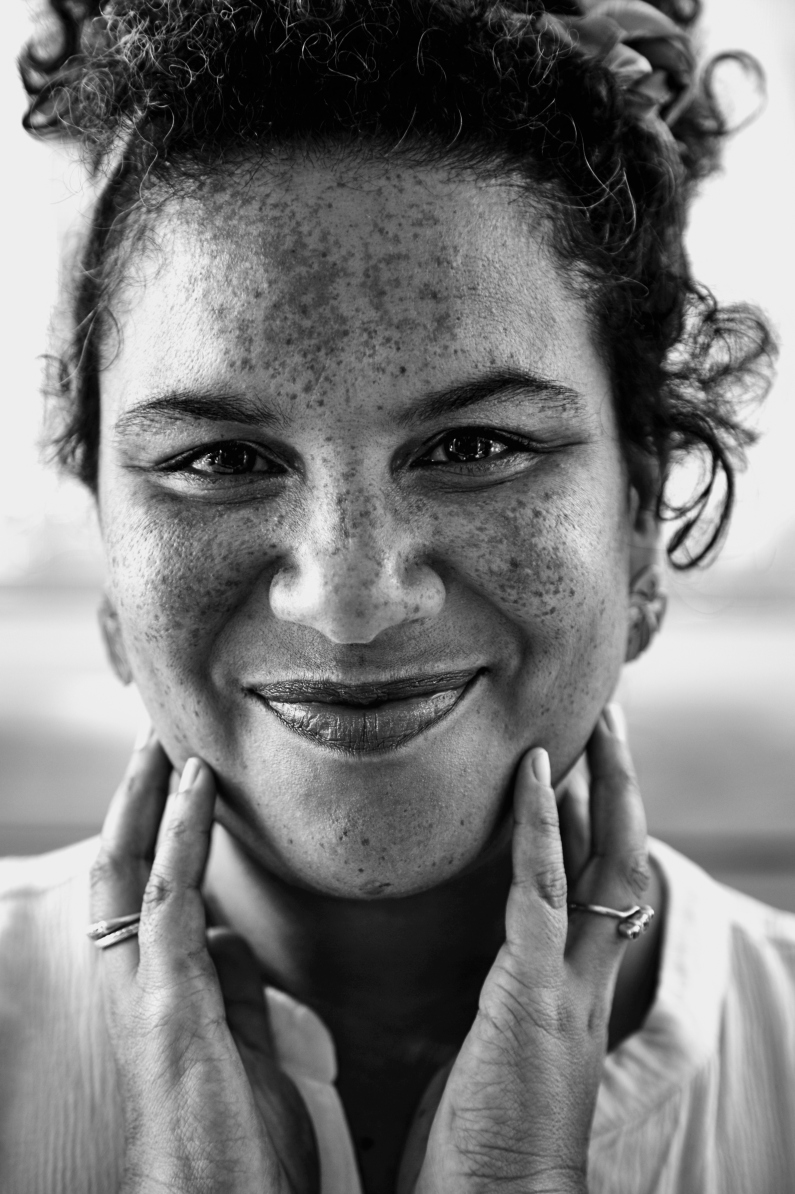Quanita Adams is an award-winning stage and screeen actress, vocalist and director. A four-time Fleur du Cap Theatre Award winner, she has taken on notable theatre roles including Valley Song, Boesman and Lena, Nadia Davids’ Cissie and At Her Feet, also penned by Nadia Davids, which was met with critical acclaim and has gone on to tour extensively over the last 15 years. We sat down to chat about her career and her latest film, Susters, which is now playing in select cinemas.
Who or what inspired you to pursue a career in the arts?
I don’t know that anything necessarily inspired me except [that] my parents encouraged me. They identified that, “If this child is going to be a fool, we might as well do as much as possible to support that.” I think growing up and being taken to theatre and to the Philharmonic orchestra and then seeing people onstage who kind of looked like me, made it possible. I didn’t start out wanting to be a performer. I studied Fine Art. I lasted two years at Michaelis and then we decided to consciously uncouple and my parents were like, “If you think you are going to be a varsity dropout after two years, think again.” Then I was like, “Fine. I’m on this campus, what else is here? Drama? I’ll do that.” I had always done it since I was a kid. All throughout my schooling career I would always be in the school plays. When I was in primary school, there used to be these magazines, one was called Upbeat and the other was called Molo Songololo and it was about making really young kids politically conscious at a very early age in as much as it was possible in those days. I remember I wrote a poem called Poverty and it had rhyming couplets and then I also drew a picture of a women with a baby on her back but the baby was strapped to her back with barbed wire. I drew it so that it all fitted into the shape of the continent of Africa. I was 11.

A child prodigy!
I don’t know about prodigy but I was just out there. I was just extra. I think that my parents, both of whom are incredibly talented in their own right, are both very artistic and they sing incredibly beautifully and are more dramatic than I could ever aspire to. I think I come from a family that was fairly encouraging of that. I studied Drama and then graduated and went off and sang in Mallorca for a year in a cover/ tribute girl band. Then I came back and did Honours. I suddenly realise that I’ve deviated from the question but I don’t know where I got my inspiration from. It just happened and then I was encouraged by my parents and then seeing people on stages and screens performing made me believe that it was possible to be a legitimate way to live ones life through one’s craft.

What was your time like at Drama School?
Honestly, I think I wasted it. I think the two years spent at Michaelis were so desperately unhappy that by the time I moved to Drama School, even though I knew everyone because we were all on the same campus together, suddenly I was two years older than the people in my class and I still had so much residual anger from my experience in Fine Arts that I kind of think I squandered a lot of the opportunities. I think I wasted it, if I’m honest. I think I didn’t go to any extra lengths to connect with any of my lecturers. Having said that, I was incredibly close to Yvonne Banning who has since passed away. She was the only one who could cut through a lot of my young adult stroppiness. To an extent, Gaye Morris. There were many incidences where the two of us would be standing across from each other shouting at each other. But it was wonderful. I made some of my best friendships, many of which I still enjoy today. My creative partnership with the good Doctor, Dr. Nadia Davids started. In fact, she cast me in one of her exam pieces when I was still a Fine Art student she did an interpretation of The Crucible but set on the Cape Flats through the filter of Pagad. This woman has been out there since day one. I think she is someone who I was always going to gravitate towards in some of other form. Our formative collaboration was when she cast me in this exam piece and because we both come from a reasonably similar background, in that we both come from Muslim families but we were educated at very posh Christian schools, we were kind of having the same conversations. We were making sense of our lives and grappling with this in the same way. My relationship with Nadia is definitely a highlight of my drama school career and I feel like the least exciting part of being at drama school was the study of it but I think that if I were to do it over again, I might be more available. I might be more present. I might possibly participate more and be less disruptive. I can admit that now. But it was also fun.

What was it that attracted you to Susters?
Firstly, it was written by two women, it’s produced by a woman, it’s being shot by a woman and it stars three women. That was incredibly exciting for me. I had met Diaan [Lawrenson] because we had presented these Afrikaans awards at some or other show and immediately we took a shinning to each other and she has become like a sister to me. We are in contact daily. Knowing that she was going to be in the movie was a great opportunity. I also subsequently learned that the part had been written with me in mind. That is a wonderful place to find oneself in this industry. I also think, to be quite honest, we are not in the kind of industry where people have the option to be like, “Meh. Next! Show me another one! Bring me another one!” You are just like, “Now I can work and it’s going to be three months of work? Yeah!” Even though the director, Corne van Rooyen, said it’s going to be an endurance shoot and I was like, “What does that mean?” It’s a road trip and we were stuck in a Land Rover. We drove from Pretoria all the way to Agulhas. They’ve cut out about 40 million hours worth of driving footage. You take the work because you are grateful for the work because its wonderful to be a working actor in this country and be in a feature film and you’re a lead [and] in fact it was written for you. I don’t know who is living this acting life where they can be like, “Oh no, its fine. You can catch me on the next one.” No, take the work that is being offered to you. It’s wonderful. Obviously having said that, if you feel compromised in any way, particularly politically… I have this idea that I am not available for certain kinds of work that compromise me politically or move me backwards. This was a wonderful opportunity to do a fun film. I call it a “Romp-Com” because we go on a romp through the country. I’ve been trying to make that go viral. It’s not working. It was a wonderful opportunity to work with a new young director who has gone on to garner incredible accolades for his film Vaselinetjie that just came out and won big awards. And just the idea that it was overly driven by women. I recently saw on Facebook someone wrote, “Oh yay, another movie starring five men…” which I think is a little jibe at Five Fingers for Marseilles, which I suppose is a bit unfair because it’s a Western and the genre is dominated by men. When I walked in Canal Walk for the premiere, on the left hand side of the one cinema was this huge billboard for Five Fingers for Marseilles starring five of the most incredible actors in the country but then opposite that was the Susters poster and it was just like three women standing on a road. I remember thinking, “That’s sweet actually. I like that.” I like that I’m part of something that feels like in a small way it is making a little increment or etch in this movement.

What is something you learned or took away from working on this film?
That I don’t like to be in a car for a long time with other people who are not my family in the middle of the Karoo when it’s minus 4 and you are wearing summer clothes. No, I learned the meaning of endurance shooting. I learned the meaning of sticking together as a crew, as a bunch of actors. The respect that I have for people who push themselves to unreasonable ends for this idea of a story. I take away my friendship with Diaan which I think is a friendship that also yields creative opportunities. The two of us keep threatening to work together and I believe that we will. Those are the kinds of things that I took away. It was the first time in my career that I felt my age and it was also the first time in my life that unapologetically I used that to attend to an issue. I think as women, we often step out in an apology. We often step out in ways we feel we need to appease people just to kind of be heard. You offer your own apology as a way to ease a conversation. For the first time, and it wasn’t even a big deal, it was just like, “No, this is not ok and I’m not available for this and I’m telling you now that nobody else should have to be.” Using the weight of myself and really not even worrying about what people say. It’s not something that I enjoy. I don’t necessarily want to be in that space constantly.
You’ve had such an incredible career in terms of the roles you’ve played but specifically the theatre roles.
Thank you.
All those characters seem to be fully realised, complex female characters. Was that something that you consciously pursed in your career?
I think that type-casting works in any number of ways and for the most part when we think of type-casting, we think of all the negative associations of stereotyping and all the rest but I think that when you flag yourself as the kind of performer who is good at this sort of thing, then people approach you to do more of that sort of thing. Sometimes that works in bad ways and there are people who kind of tend to get stuck in roles that perhaps don’t necessarily move anything forward, not conversations, not careers, not narratives. I’ve been very lucky in that the roles that I’ve been offered have been about being slightly more expansive about this conversation around what it means to be a woman and not just a woman of colour. A woman. I think when people come to me, they associate me with being able to do these kinds of things. I think I work incredibly hard to be associated with the kind of work that makes these shifts in the way that people see me. Then it also just means that you can kick back and do the slightly more frivolous roles or the comic roles or the less serious roles but I think it’s all part of the trajection.

I have a bit of a fan girl question…. I read that you did a couple of episodes on ER and I am dying to know about that.
I did. There are parts of my life in my career where I think back at them and I just laugh because they are insane. I did do ER. I wasn’t with George Clooney but I was with Noah Wyle and Mekhi Phifer. I played this Iraqi nurse called Zahra and I had to have an Arabic dialect coach who I randomly ran into the other day. That was cool to shout at Hollywood actors in my bad Arabic.

I noticed that you’ve worked with some of the most phenomenal female directors in South Africa. Do you actively try to work with women or has it been quite a mix?
It has been a mixed bag. If I think of my favourite productions, there’s a man in there. I think it’s about the relationship and the conspiracy around storytelling that you enter into with a director. I have to reference my relationship with Nadia because we are very different but we have similar ideas around things and there naturally is a shorthand culturally, but just in terms of even politically or our gender politics, even though there are fault lines that kind of split us but for the most part, because we are so similar but we work in different forms that quite seamlessly and quite beautifully work together, it’s wonderful to be able to get into a room with Nadia and then just have things happen. I recently watched What Remains and knowing what its like to work with Nadia, to see that is incredible because then you are forced to kind of distance yourself from her and see her for the writing of it. That is also quite lovely, to be able to see work through your friends or the people who you’ve worked with’s filter. I love working with women and in fact, I will often be more willing to negotiate around rates or availability if it means that we can work together, particularly women of colour. I try as hard as possible, I bend over backwards to be available for that and again, not that I’m turning away work left, right and center but I do think that we are at such an exciting and dynamic time now in terms of being creative and being creators, that any and every opportunity we have to work together [and] to work with each other, we need to run with those opportunities. If I am presented with opportunities to work with women, particularly women of colour, I do that. I’m writing a TV show which is autobiographical and its about my last year of primary school in 1989. It’s kind of a coming of age story for this young girl, set to the context of the coming of age of our country. I am working with incredible young women. It’s being produced and then directed by a woman who grew up about 10 minutes away from my house. It’s also about peopling this world with people who understand what it means to be able to tell these stories in our voices.

You’ve collaborated with Nadia several times but I wanted to ask you about working on At Her Feet which you’ve performed numerous times over the past 15 years. What has it been like to step back into that project?
It’s frustrating for Nadia because I always forget my words but I always remember the song of the word, like the tune of it. I let things go. She remembers everything. It’s frustrating for her because she’s like, “How have you forgotten this in 15 years?” But it is wonderful. When we did it now, also because I’m older, I had anxiety that I might not physically be strong enough. It’s 90 minutes of non-stop talking and there is a dance thing and I’m rapping and I’m singing. In this last run, for the first time in 15 years, I accidentally said a line with a different inflection. I just happened to hit a different word and I was like, “Nads, do you know that this character… this is what she means?!” And she was like, “That’s actually how I wrote it originally but for 15 years you’ve just been doing it this other way and its convincing.” And I was just like, “But why didn’t you tell me?” Just this discovery of new things and I think that is a hallmark of an exceptional text. It’s why we still do Shakespeare or why we pour over Fugard or why we can excavate meaning from texts that are 100 years old, because it is so layered. Every time I pick those women up, it’s the nostalgia of the very first time but it’s also the possibility of a whole new turn. Because I’m older and because it had been quite a while since last I did it, I feel differently towards the women. I used to love Aisha, the rapping one and now I’m like, “Pfft, this kid. She needs to grow up.” Now, suddenly, I love Tyra, the skinny little Indian one. My ideas around these women have changed. Again, it’s the possibility of something new out of something that feels so familiar.
Because the production was met with so much acclaim, and awarded you a Fleur du Cap Theatre Award, do you feel like there’s an added pressure of other people’s expectations every time you step back into it?
Let me tell you something, awards in this country do nothing but give you ornaments. Not to take away from the idea of accolades but to be quite honest when people come and see me perform and they don’t leave, that is the thing. When they laugh when they must laugh and they clap when they must clap, and they cry when they must cry and they don’t get that mixed up, that is the thing. It’s wonderful and we need these nights and its all lovely. I get excited about awards that have money because I’m just like, “My bathroom tiles need to be redone.” I don’t feel the pressure of this idea of an award because its done. I feel like it’s a bad thing to say and if the Fleur du Cap judges are reading this, I just want to say thank you for your continuous support for the arts. The point is, I feel a pressure to these women. My uncle once asked me, “How do you remember all the words?” And I said, “Well, there are four women and they each get two opportunities to speak and out of a lifetime of anecdotes to help explain your place in the world, Nadia has said to these women: You get two chances. So choose them.” That’s what I feel the pressure for. I love that people come and they laugh in anticipation. There have been times when people will throw out a line before the time and then you kind of just have to pause and let the audience have that moment because it is beautiful because it’s a conspiracy and it’s at a point with this work now where we come together to watch these women get their two chances to share their lives with us. I just want to do right by these women. I really want to have their stories told and hope that they resonate now.

Who are some South African women in the arts that inspire you?
Anyone and everyone who is out there working. Like are you working? Are you making it work and you working at it? And you’re a woman? Then you are my hero. Denise Newman who is out there doing the most in memory of Dulcie September as we speak. Sylvia Vollenhoven who is a journalist and a playwright and a filmmaker who is out there doing the most. I want to salute her. Nadia! My friend Lucilla Blankenberg who is the producer at CMT and their organisation heads up GroundUp. She is doing the most. The actors that I’ve had the immense pleasure to be able to work with over the years like Sibulele Gcilitshana who is up in Joburg just doing the most, raising a family, in her home doing the most. Diaan Lawrenson who is going to kill me if I tell you but the show that they did which is a kind of ‘where do you come from’ was mentioned by the minister in his budget speech as a beacon of hope for being able to have our stories be able to resonate with one another. Young women who are also doing the most, like Amy Jephta. I follow her on Instagram and she’s working with HBO! I’m like, “H-B-Oh my god, you are out there and we look like each other and it’s incredible.” Young playwrights, Faith Kinniar who I was lucky enough to direct her work. She is young and exciting and dynamic. Faniswa Yisa! Marlene le Roux at Artscape. Lara Bye, my first director who directed me in For Coloured Girls…, who keeps theatre alive in ways that are different and exciting and dynamic and she is still providing opportunities for young people. Those are just some women off the top of my head. I’m sure I’ve forgotten someone and it’s going to freak me out but ultimately if you are working and you are working at it and you are making it work and you are paying your bills and you are keeping it together no matter what and you are in this industry, then you are my hero.
Susters is now playing in select theatres. For a list of theatres, please visit the Susters official Facebook page.
You can follow Quanita on Instagram or via her official Facebook page.
Special thanks to Chris de Beer and David Alex Wilson.
All photos were taken by Chris de Beer on April 4th 2018.
Sarafina Magazine and Chris de Beer maintain copyrights over all images. For usage or inquiries, please contact us.

Words cannot describe you. You are one amazing talented person I’ve ever come across. I salute you. Keep up the good work. You someone everone can look up to.
LikeLiked by 1 person
Isn’t she amazing? Thanks for reading Sarafina Magazine.
LikeLike
Quanita Adams, a Phenomenal woman, so very proud of you, a brilliant article and the photographer captured your inner beauty, you are a shining Star and everything you touch, turns into Gold 🙂
LikeLiked by 1 person
We couldn’t agree more 😊 Thanks for reading!
LikeLike
I remember her 1st Fluer du Cap she won and the prediction was that there’s great things in store for her. This interview she stayed true to herself as a outstanding human being.
LikeLiked by 1 person
And so many more great thing to come for this talented and grounded artist! Thanks for reading Sarafina Magazine.
LikeLike
Pingback: A Conversation with Diaan Lawrenson – Sarafina Magazine
WoW! Very Inspiring!
LikeLiked by 1 person
Pingback: A Conversation with Faniswa Yisa – Sarafina Magazine
Pingback: A Conversation with Meg Rickards and Christia Visser – Sarafina Magazine
Pingback: A Conversation with Jill Levenberg – Sarafina Magazine
Pingback: A Conversation with Nadia Davids – Sarafina Magazine
Pingback: A Conversation with Liezl de Kock – Sarafina Magazine